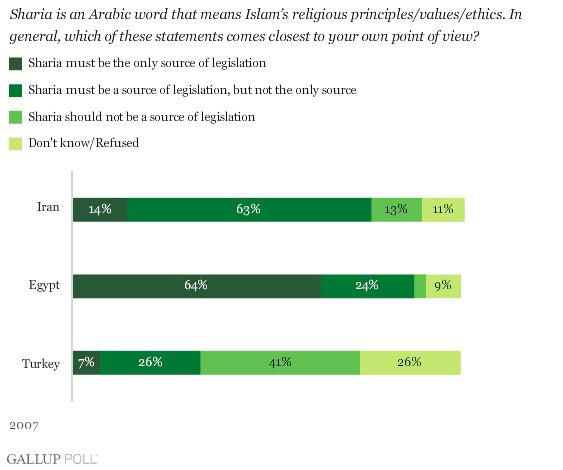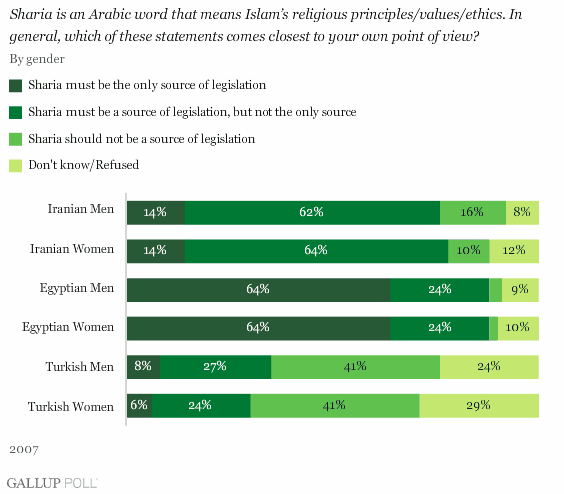This article is the first in a series on views toward Sharia in Iran, Egypt, and Turkey.
WASHINGTON, D.C. -- A Gallup Poll conducted in Iran in 2007 shows a majority of residents think that Sharia, the body of Islamic rules and principles that informs a Muslim's life, should have some influence on legislation. However, Egyptians and Turks surveyed offer strikingly contrasting views.

In Turkey, a parliamentary democracy whose secular character is spelled out in the national constitution, the public is more divided about the role Sharia should play in national law than the public in neighboring Iran. But in Egypt, where strong presidential rule is in place, public opinion is much more likely to favor religious law as the only source of legislation.
It is often assumed that women oppose religious law, but the poll findings reveal that men and women express strikingly similar views within each country on the role of Sharia in legislation.

In Iran, majorities of men (62%) and women (64%) tell Gallup that Sharia must be a source of legislation, but not the only source. Identical percentages of men and women (14%) think it should be the only source of legislation, and fewer than 2 in 10 men and just 1 in 10 women think it should not be a source of legislation.
Egyptians' views about the role of Sharia contrast dramatically with those of Iranians. Almost two-thirds (64%) of Egyptian men and women say Sharia should be the only source of legislation, while about one-quarter (24%) of men and women think it should be one of the sources. Few Egyptians, 3% of men and 2% of women, say it should not be a source of national law.
Poll findings in Turkey show how divided the Turkish public is about the role of Islam in the public sphere. Forty-one percent of men and women think religious law should not be a source of legislation. About one-quarter of respondents (27% of men and 24% of women) think Sharia should be one of the sources of legislation, and fewer than 1 in 10 respondents (8% of men and 6% of women) say it should be the only source. However, many in Turkish society did not offer an opinion about the role of religious law: 24% of Turkish men and 29% of Turkish women say they don't know or refused to answer.
The significance of religion provides important context to understand the influence of Sharia in all three countries. In Iran, 73% of men and 78% of women say religion plays an important role in their lives, and in Egypt, virtually all men (98%) and women (99%) say the same. But even in staunchly secular Turkey, religion looms large for most individuals. Seventy-four percent of Turkish men and 72% of Turkish women tell Gallup that religion plays an important role in their lives. For many Muslims, the combination of the importance of religion and the divine foundations of Islamic religious law give Sharia legitimacy to provide checks and balances on a government's powers. Overall, the poll findings show that within each country, men and women hold similar views about Sharia. Iranians, Egyptians, and even many Turks believe religion and government can be integrated.
Survey Methods
Results are based on face-to-face interviews with 1,004 adults, aged 15 and older, in Iran in June-July 2007. In Egypt, results are based on face-to-face interviews with 1,024 adults, aged 15 and older, in July 2007. In Turkey, results are based on face-to-face interviews with 1,001 adults, aged 15 and older, in May 2007. For results based on the total sample of national adults, one can say with 95% confidence that the maximum margin of sampling error is ±3 percentage points. In addition to sampling error, question wording and practical difficulties in conducting surveys can introduce error or bias into the findings of public opinion polls.